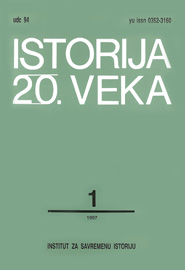SRBIJA I JUGOSLAVIJA – PROSTOR, DRUŠTVO, POLITIKA - POGLED SA KRAJA VEKA
THE SERBS AND YUGOSLAVIA - SPACE, SOCIETY, POLITICS - A LOOK FROM THE END OF THE CENTURY
Author(s): Ljubodrag D. DimićSubject(s): Political history, Social history, Recent History (1900 till today), Nationalism Studies, History of Communism, Politics and Identity
Published by: Institut za savremenu istoriju, Beograd
Keywords: Yugoslavia; Serbs; space; society; politics; end of the century; Yugoslav unification; national body; KPJ;
Summary/Abstract: The Yugoslav unification was, according to research, not a »historical coincidence« but the result of a century-long historical process. This unification marked an important turning point for the Serbian people. Gathered as they were in 1918 within the borders of the Yugoslav state and having a marked policentric tendency, the Serbs had the chance of using the oncoming Yugoslav unification as a stepping stone for the integration and modernization of their own national body. Why this opportunity was not seized is a question the author studies while analyzing a series of historical events which throw light on the connection between region, society and politics in the 20th century. The Yugoslav region was diverse, rough and dissipated, characterized by a thousand differences. On this soil, saturated by a long flow of history, the Serbs lived and built the Yugoslav state. A restless region, repeatedly cought up in turmoil in the periods 1912-1918, 1939-1945 and 1989-1995. The population resembled the region. Thinned out and empoverished by the hardships of war and genocide, affected by internal and external migrations, frequently faced by loss of identity, deprived for half a century of the spiritual and moral guidance of the Serbian Orthodox Church, stranded between the traditional and the modern and between city and country, driven to ideological fanaticism, divided and opposed within, afflicted by bad communication systems, without a middle class, forced by circumstances to painstakingly create and easily give up its elite, »freed« from the fetters of tradition and unwilling to obey laws, only partly emancipated by modern education, used to hunger and poverty and torn by illness the Serbian society lagged behind the modern world throughout the 20th century, neglected, disunited and unitegrated. The historical region in which the new state was formed and the population within its borders have determined the life in the Yugoslav state. First the middle class and later the revolutionary factor (the Communist Party of Yugoslavia - KPJ) were unable to integrate the territory and the population through cultural and economic aspects but used politics and ideology instead. An approach which bore little result.
Journal: Istorija 20. veka
- Issue Year: 1997
- Issue No: 1
- Page Range: 7-34
- Page Count: 28
- Language: Serbian

